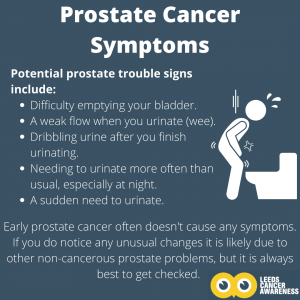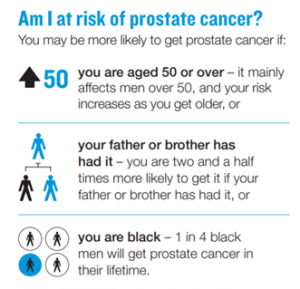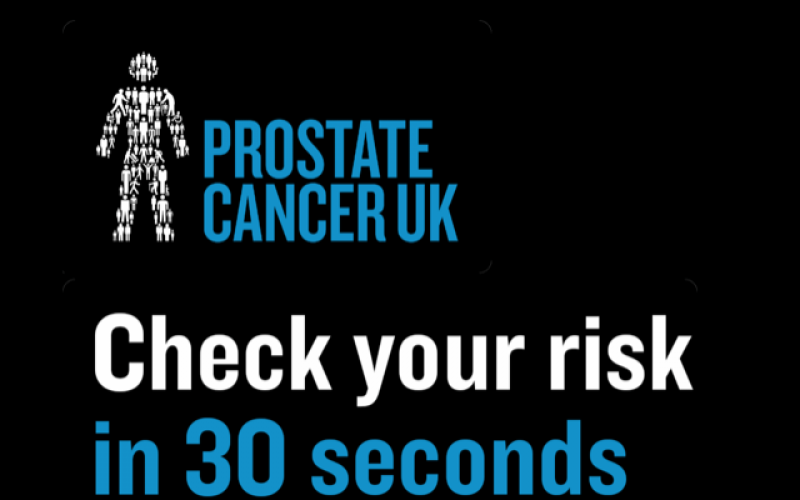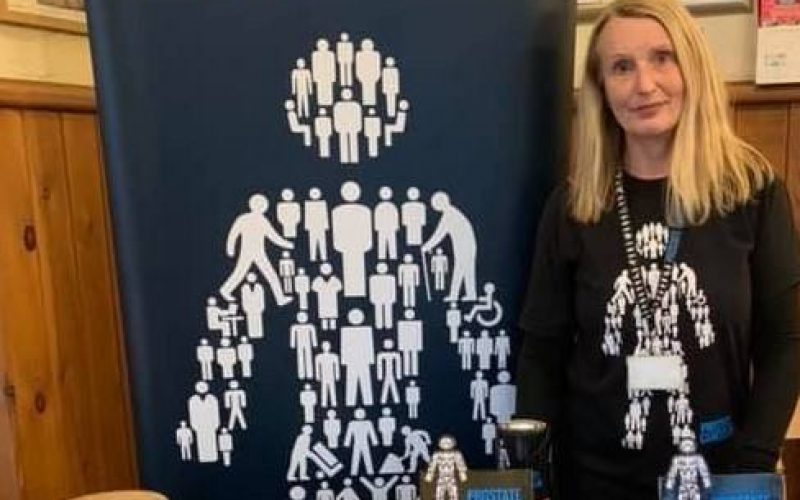The following blog has been written by David Stapleton.
I knew quite a bit about prostate cancer, as I worked in the NHS as a Practice Manager, but more poignantly, my brother-in-law had tragically succumbed to the disease a few years ago. I was therefore aware of some of the signs and symptoms, as well as the devastating impact it had on families.
I was in my mid to late 50’s and became increasingly aware that I was having “some problems down there”. I was often waking up in the night to use the toilet, sometimes two or three times on a bad night. Even though the loo was only a few feet away I had a real sense of urgency to get there, but when I did, it sometimes took a while to start! Perhaps more worryingly I thought I had finished, but unfortunately my body had other ideas! This resulted in what is politely, but very accurately, referred to as “after dribble”.
I knew that I had to act, both for my and my family’s peace of mind and so I booked an immediate appointment with my GP. He “digitally” examined me (nothing to do with computer programmes I am afraid!), which I guess was not pleasant for either of us. He also did a PSA blood test to check if the levels were higher than normal. These confirmed that there was reason to refer me on a 2 week wait for suspected cancer. Again, because of my work, I knew that over 90% of ‘suspected’ cancer referrals were returned as not actually cancer so I was not unduly concerned at this stage.
I had my specialist examination which included another digital examination, or as they call it “the urologist’s handshake”. The specialist said that he had felt “a horn on the left side of the prostate” and wanted me to go for urgent further investigation. I had a biopsy the next week, where they insert a small probe into your back passage to take a few targeted cells and a few random cells which are then checked in the lab. The guy who took the biopsy likened it to “being stung by a bee on your prostate”, which made me wonder where he kept his bees!
I had a nervous couple of weeks wait for the results and unfortunately, they confirmed that I did have low grade prostate cancer. You quickly become ‘an expert’ having read up on your condition and I knew that they use what is called the Gleason score to grade the cancer, and at Gleason 6 mine was still classed as low grade.
Then you make probably the biggest decision that you probably have had to make in your life up to then! How do you want to be treated? There are several options open, and due to my relatively young age I was “lucky” to be able to choose from them all. The specialist team in Leeds was fantastic and made sure that I had all the pros and cons for each to make a well-informed decision. I vividly recall sitting in the waiting room before speaking to the specialist and thinking that I was far too young to be here. I reckoned the next youngest after me was in his 70s and here I was still in my 50s. Unfortunately though, cancer does not care about your age.
At the same time a good friend of mine had also been diagnosed as having prostate cancer so we were able to bounce thoughts and ideas off each other. My friend was Afro-Caribbean and the only reason I mention this is, unfortunately this fact meant that he was twice as likely to get prostate cancer as I was, and the risk of it being more aggressive was higher. He therefore (wisely in my opinion) decided to have his prostate removed as soon as was possible. He was quite surprised that I was prepared to live with cancer inside me, when I too had the option to have it removed.
That is the thing with cancer patients. No two are ever the same, and the only right decision is when you have the luxury of looking back on a positive outcome in years to come. Yes, we were there for each other and we spoke about our options and hopes, but he openly admitted that he wanted “this thing” out of him asap. I had weighed up the options and the risk of it getting more aggressive, and I felt that time was on my side.
I therefore chose what is called active surveillance. This is available to relatively young and fit men whose cancer is not aggressive. You have a PSA test every few months and if any significant increase is noted, you have another biopsy to check if the cancer is spreading.
For two years I learned to live with the fact that I had cancer. Did it change my life? Not really. Did it change my outlook on life? Definitely. I was always hot-headed, and this could get me into trouble, but I took a conscious decision to try and take each day as it came, and not get too stressed about stupid things. I also made sure that I told as many people as I could about my symptoms and prognosis. I wanted to make sure that they got checked out if they had ANY concerns, but more importantly I wanted to show them that you can still have a great life with prostate cancer.
Then suddenly and without warning it changed after 2 years. My PSA increased significantly, and I was rushed back to have more bees stinging my prostate! The scan showed that the cancer had spread slightly outside the capsule of the prostate, and biopsy unfortunately showed that it had got more aggressive.
I was scheduled for an operation as soon as possible and found myself laid in pre-op being asked for my name and date of birth by seemingly everyone who happened to walk past, but better to be safe than sorry eh?
My surgery was done robotically and consequently I have 6 little scars rather than one big one, which are fading nicely. Because the cancer had spread outside the gland, I had to have quite a bit of my lymph nodes removed on that side and this does have some side effects. I did have some issues for a while after the operation, but this is perfectly normal. I was incontinent for about 6 months, but with training and exercises this got better, and the nurses were fantastic. I wasn’t really that embarrassed (it could have been worse!) and again told people that this was a natural consequence of the operation.
I am now almost back to where I was before. I go to the gym and enjoy socialising with my family and friends. I go to watch my beloved football team and have a laugh with my mates.
Do I still have the occasional “dribble”? Yes, usually when I have been drinking and I laugh too much. Does it bother me? Not in the slightest. It could have been a lot worse, and I am enjoying life to full. The bottom line is that if you are at risk, have symptoms or have any questions, the sooner you get yourself seen the more chance you have of catching it before it has spread and then, like me, you have all the options on the table.
Thank you to our guest blogger David Stapleton, for taking the time to write this blog.
The content of this blog has been written by David Stapleton and is representative of their views not the views of Leeds Cancer Awareness. If you would like to reproduce any aspect of this blog please seek the permission of the blog author.
Other Resources
For more information on prostate cancer visit, Prostate Cancer UK.
For more Leeds Cancer Awareness guest blogs visit, Leeds Cancer.
To check your prostate cancer risk in 30 seconds visit, Prostate Risk Checker.






